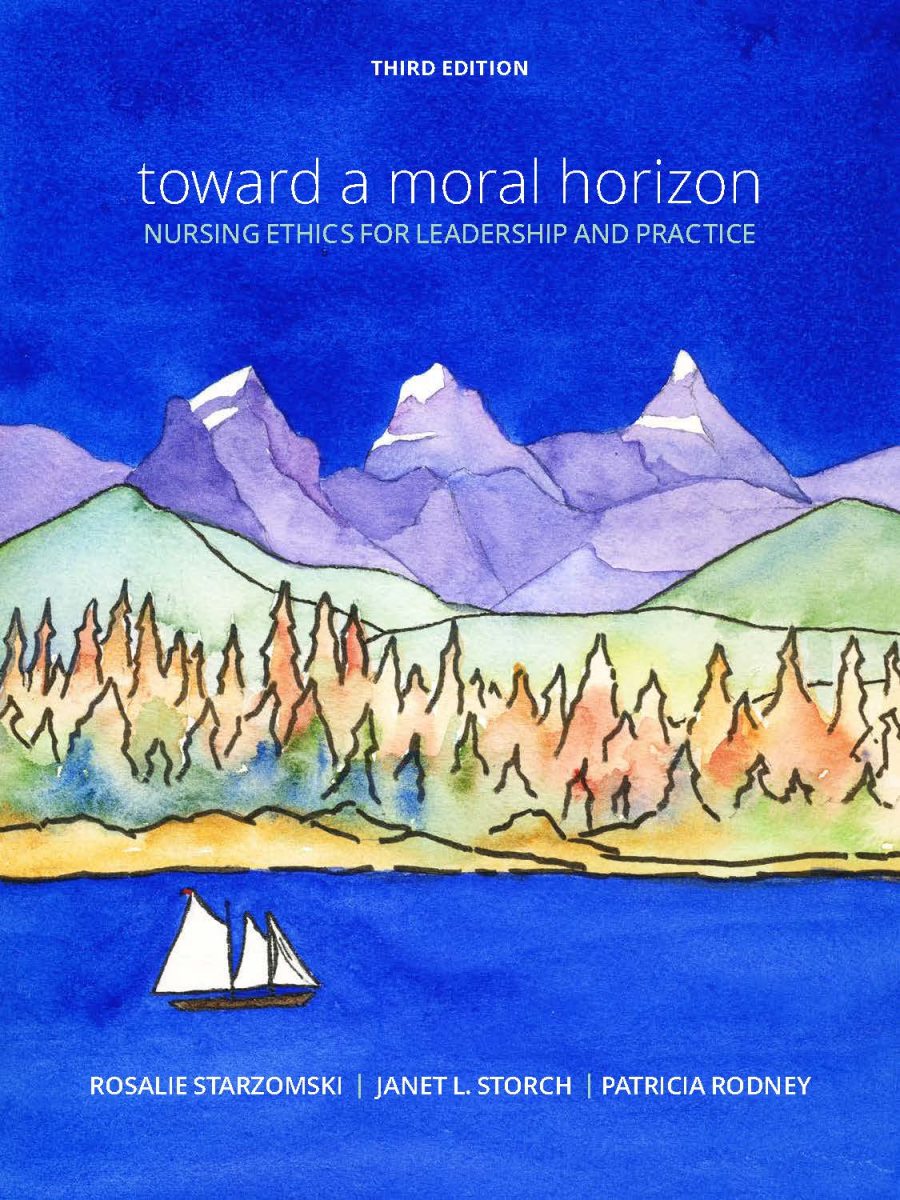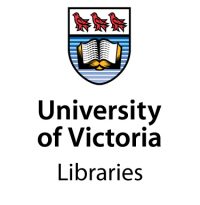Toward a Moral Horizon: Nursing Ethics for Leadership and Practice edited by Rosalie Starzomski, Janet L. Storch, and Patricia Rodney is a new release published by the University of Victoria Libraries ePublishing Services. It can be downloaded for free on UVicSpace: https://dspace.library.uvic.ca/handle/1828/13021
 This third edition of Toward a Moral Horizon: Nursing Ethics for Leadership and Practice will assist nurses and all health care providers to take up the challenge of embedding ethics in health care practice, education, research, and policy at all levels—from local to regional to global. In the current, complex health care environment, more nurses are engaging in graduate studies to enhance their knowledge and expertise in providing necessary leadership in all health care settings. As a result, there is a growing need for an advanced nursing ethics text, and so this book is targeted towards graduate-level and upper-level undergraduate nursing students, as well as nurses in leadership roles—providing a much-needed resource for these groups.
This third edition of Toward a Moral Horizon: Nursing Ethics for Leadership and Practice will assist nurses and all health care providers to take up the challenge of embedding ethics in health care practice, education, research, and policy at all levels—from local to regional to global. In the current, complex health care environment, more nurses are engaging in graduate studies to enhance their knowledge and expertise in providing necessary leadership in all health care settings. As a result, there is a growing need for an advanced nursing ethics text, and so this book is targeted towards graduate-level and upper-level undergraduate nursing students, as well as nurses in leadership roles—providing a much-needed resource for these groups.
This edition was written during a period when the COVID‑19 pandemic caused a health care crisis in Canada and around the world, provoking what the authors of one of the chapters called “a clarion call for change” in health care provision. The pandemic brought the fault lines of the Canadian health care system to the forefront of awareness, and profoundly affected patients, families, communities, as well as nurses and other health care providers. In addition to the influence of the pandemic, society is in the midst of rapid growth in science and technology. Now, more than ever, nurses need to use nursing ethics when developing their moral compasses for leadership. In this book, the writers focus on ethical knowledge for advanced practice nurse leaders to effect change and improve moral climates in nursing research, education, practice, and policy settings. They focus on social justice and equity as essential values of nursing ethics. Several chapter authors describe ways that nurses can press for improvements in the health care of vulnerable people who may be lacking access to quality health care: for example, Indigenous people, older adults, those who are coping with mental illness, substance use challenges, and those who have a disability. Social justice and equity issues are also explored in a chapter on global health.
This book is structured in three sections, comprised of 22 chapters written by Canadian experts in ethics. In the book, authors map the moral climate for health care and nursing ethics and describe theory related to nursing ethics. They illuminate the use of nursing ethics in diverse populations and with people at all stages of life; and apply nursing ethics to new developments in health care issues and technologies. Educators will be able to bring the content of this book alive with Ethics in Practice scenarios and reflective questions for students that are located in each chapter. Many chapters also include figures or appendices showing models and guidelines that can be used to assist with ethical decision making.
This third edition includes several new chapters, including a chapter on nursing ethical theory as distinct from bioethics, as well as chapters related to people with disabilities, Indigenous health ethics, nursing leadership, and digital health technology. Many topics covered in previous editions are revised and updated. For example, the updated chapter about health care at the end of life now includes an in-depth discussion of medical assistance in dying (MAID). Further updates are included in the areas of research ethics in nursing; the development of the Canadian health care system; nurses as moral agents, and the problem of moral distress; the application of nursing ethics in caring for patients at all stages of life; home health care ethics; ethical issues in biotechnology, and the broad areas of public health ethics and global health ethics. Chapter authors model the use of inclusive language in their writing as applied to gender diverse people and people with disabilities. Extensive references and resources are provided for readers at the end of all chapters.
This edition is cutting-edge as the authors recognize the importance of inclusive language, since language affects attitudes towards people and the way they are treated. In particular, chapter authors in this text model the use of inclusive language in their writing as applied to gender diverse people and people with disabilities.
This third edition is an open access, online publication, meaning that the book is accessible to all with no cost to the readers. This online publication also allows for new features, including two videos, with their accompanying transcripts, where listeners will gain a personal understanding of the contributors’ perspectives. In one video, Indigenous nurse scholars form a traditional circle online, as they discuss nursing ethics from their Indigenous perspectives. The other video showcases two nurses with expertise in digital health technologies in conversation with the book’s editors.
It is the hope of the editors that readers of this third edition will step boldly into shaping the future of health care by becoming more engaged in ethical practice, and becoming more confident in their leadership roles in health care. The content of this text can contribute to the knowledge needed for nurses to make ethical choices knowingly and wisely, so they can demonstrate moral imagination and moral courage in the face of challenges that confront them at all levels of the health care system.
Editors
Dr. Rosalie Starzomski is a professor emeritus at the University of Victoria School of Nursing. She is a graduate of Dalhousie University with a Bachelor of Nursing, the University of Calgary with a Master of Nursing, and the University of British Columbia (UBC) with a Doctor of Philosophy (PhD) in Nursing. Her research, practice, teaching, and publications are focused on health care and nursing ethics, organ donation and transplantation, nephrology, biotechnology, end-of-life care, and advanced nursing practice. She is an advanced practice nurse leader in nephrology and transplantation, and for a number of years, was an ethics consultant at the Vancouver Coastal Health Authority and committee chair for several ethics committees. Dr. Starzomski is co-editor of three editions of the book Toward a Moral Horizon: Nursing Ethics for Leadership and Practice.
Dr. Janet (Jan) Storch is a professor emeritus at the University of Victoria School of Nursing. She earned her degrees from the University of Alberta: a Bachelor of Science in Nursing, a Master of Health Services Administration, and a Doctor of Philosophy (PhD) in Sociology. Dr. Storch has been a scholar in health care ethics and nursing ethics since the mid-1970s. She was a professor in the Health Services Administration program at the University of Alberta and developed and taught courses on the history and values of the Canadian health care system. Dr. Storch is a former dean of the Faculty of Nursing at the University of Calgary, and a former director of the School of Nursing at the University of Victoria. She is co-editor of three editions of the book Toward a Moral Horizon: Nursing Ethics for Leadership and Practice.
Dr. Patricia (Paddy) Rodney is an associate professor emeritus at the University of British Columbia School of Nursing. She holds a Bachelor of Science in Nursing from the University of Alberta; a Master of Science in Nursing from UBC; and a Doctor of Philosophy (PhD) in Nursing from UBC. Dr. Rodney worked in critical care nursing at St. Paul’s Hospital, where she had the opportunity to learn about—and later teach in—a rapidly evolving area of clinical nursing practice. She came face to face with ethical challenges regarding end-of-life decision making for patients and their families, and witnessed the moral distress experienced by nurses and other health care providers. This fostered her lifelong interest in nursing ethics and health care ethics. She is a co-editor of three editions of the book Toward a Moral Horizon: Nursing Ethics for Leadership and Practice.
